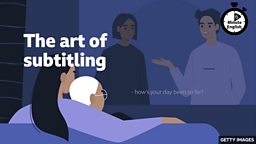6 Minute English
Intermediate level
Why do we procrastinate?
Episode 230216 / 16 Feb 2023

Introduction
Why do people procrastinate? We’ll hear from a comedian who likes to leave their work until the last minute, and as usual, we’ll be learning some new vocabulary as well.
This week's question
According to recent research by DePaul University in Chicago, what percentage of people procrastinate so much that it interferes with their day-to-day life?
a) 10 percent
b) 20 percent
c) 30 percent
Listen to the programme to find out the answer.
Vocabulary
procrastination
delaying doing things that must be done until later, often because they are boring, difficult or unpleasant
without a shadow of a doubt
used to emphasise that you are completely certain of something
under pressure
feeling stressed or anxious because of having too much to do
impulsive
acting suddenly and instinctively, without thinking about the consequences of your actions
gratification
feeling of pleasure and satisfaction
oodles of (something)
a very large amount of something pleasant
TRANSCRIPT
Note: This is not a word-for-word transcript.
Sam
Hello. This is 6 Minute English from BBC Learning English. I’m Sam.
Neil
And I’m Neil.
Sam
Come on, Neil, let’s make a start! I’ve got a deadline to meet today, and I haven’t finished my work yet!
Neil
Let me guess, it’s because you delayed, and delayed, and put your work off until the last minute - as usual! You’re a real procrastinator, Sam – someone who keeps delaying things that need to be done.
Sam
What can I say? I work better when a deadline is approaching.
Neil
I see, but did you know that that people who procrastinate have higher levels of stress and lower wellbeing? Procrastination is also linked with lower financial and career success, so there's a lot of reasons not to do it.
Sam
In this programme, we’re discussing procrastination – the act of delaying things that must be done until later, often because they’re difficult, boring or unpleasant. And, as usual, we’ll be learning some new vocabulary along the way.
Neil
So, without wasting any more time, I have a question for you, Sam. The fact that procrastinating, or putting things off, is bad for us doesn’t stop people doing it. According to recent research by DePaul University in Chicago, what percentage of people procrastinate so much that it interferes with their day-to-day life? Is it:
a) 10 percent?
b) 20 percent? or,
c) 30 percent?
Sam
I’ll guess that around 10 percent of people have a serious procrastination problem.
Neil
OK, Sam. We’ll find out the answer later in the programme. Sam is certainly not alone in putting things off until the last minute. Here’s Ella al-Shamahi, presenter of BBC Radio 4’s, Why Do We Do That? talking to the comedian, Eshaan Akbar, about his procrastination habit:
Ella al-Shamahi
Would you say, Eshaan, that you're a procrastinator?
Eshaan Akbar
I am a serial procrastinator without a shadow of a doubt.
Ella al-Shamahi
Why? Why do you think you procrastinate?
Eshaan Akbar
Over the years, I've told myself that I procrastinate because I work better under pressure. That's what I've told myself.
Sam
Eshaan thinks that he is a procrastinator without a shadow of a doubt, a phrase which is used to emphasise that you are completely certain of something.
Neil
Eshaan also says that, like Sam, he works better under pressure, when he feels stressed or anxious because of having too much to do. But maybe, also like Sam, Eshaan has a problem organising his workload and managing his time.
Sam
Hang on, Neil, my time management skills are OK, thank you! With me, it’s more of an emotional response – I see a mountain of work, feel threatened, and think, ‘how on earth will I finish all that?!’
Neil
What Sam says is supported by a theory of human evolution which explains how putting things off is an emotional response. Back when we were living in caves, life was dangerous and short, and our ancestors were impulsive – they acted suddenly, on instinct, without thinking about the consequences of what they were doing. Back then, being impulsive was a good thing, but in modern life, with work goals and deadlines, when we are impulsive and get distracted, we procrastinate. So rather than being a problem with time management, Sam should blame her caveman ancestors who acted on impulse.
Sam
Hmm... Let’s listen again to comedian Eshaan Akbar talking how he feels when he procrastinates:
Eshaan Akbar
A lot of stuff you read about procrastination focuses on the time management element of it… I probably got a better sense that for me it seems very squarely around the emotional aspect of it. Perhaps I get more emotional gratification from doing it last minute. And, I need to understand why I prefer that over the calm serenity of getting things done with oodles of time on my hands.
Neil
In the same way that our ancestors felt good living on impulse, Eshaan thinks he gets gratification -a feeling of pleasure and satisfaction – from doing things at the last minute. What he doesn’t understand is why he prefers to work under pressure, instead of finishing calmly with oodles,or lots of,time.
Sam
Unlike Eshaan, I’d rather finish my work feeling relaxed, but there never seems to be enough time.
Neil
Well, breaking down the task into smaller stages also breaks down the level of threat you feel from your workload. Also, forgiving yourself for procrastinating in the past seems helpful in avoiding procrastinating in the future. So, forgive yourself and start making changes, Sam, before you end up like the timewasters in my question: what percentage of people procrastinate so much that it interferes with day-to-day life.
Sam
Well, I guessed it was 10 percent.
Neil
Which was… the wrong answer, I’m afraid. In fact around 20 percent of us have a procrastination habit so strong it makes life difficult. Okay, let’s recap the vocabulary we’ve learned from this programme on procrastination – delaying, or putting off, doing things until later, often because they’re difficult, unpleasant or boring.
Sam
The phrase without a shadow of a doubt is used to emphasise that you are completely certain of something.
Neil
If you’re under pressure, you feel stressed or anxious because of having too much to do.
Sam
Impulsive behaviour is sudden and spontaneous, done without thinking about the consequences.
Neil
Gratification means a feeling of pleasure and satisfaction.
Sam
And finally, when you have oodles of something, you have a lot of a very large amount of something pleasant…. like time, which once again we’ve run out of. I’m rushing off to finish my work, Neil, but remember to make time to join us again soon, here at 6 Minute English. Bye for now!
Neil
Bye!
Latest 6 Minute English

Sexism: Female farmers fighting back
Episode 231228 / 28 Dec 2023
How can female farmers beat rural sexism?



Invasive species: Why don't we eat them?
Episode 231207 / 07 Dec 2023
Could we eat invasive species?

What and where is Little Italy?
Episode 231130 / 30 Nov 2023
Mozzarella, ricotta, cannolis and focaccia... Where are we? Little Italy of course!

Social media and teenage health
Episode 231123 / 23 Nov 2023
What are the health risks of social media for teenagers?








Sounds that make you want to scream
Episode 230928 / 28 Sep 2023
Are there any sounds you find upsetting?




The stories behind our names
Episode 230831 / 31 Aug 2023
What do our names reveal about our culture and family history?


Are you unhappy at work?
Episode 230817 / 17 Aug 2023
Does work leave you feeling bored and exhausted?







Is it wrong to eat plants?
Episode 230629 / 29 Jun 2023
Should we treat plants with the same consideration we treat animals with?



The art of subtitling
Episode 230608 / 08 Jun 2023
Hear how subtitles can help bring TV and movies to life

Ecotourism: good or bad?
Episode 230601 / 01 Jun 2023
We discuss the growing popularity of ecotourism.

Can climate change cause more disease?
Episode 230525 / 25 May 2023
With warming temperatures, mosquitos are now spreading to new areas, including Europe.



Ice and the origins of life on Earth
Episode 230504 / 04 May 2023
We talk about an essential element for life to thrive.

Women in politics
Episode 230427 / 12 Apr 2023
We discuss some of the reasons why women make up only 26% of the world's politicians.

What's the point of museums?
Episode 230420 / 20 Apr 2023
We discuss the role of museums in the 21st century and the items taken from different countries.

How culture affects sadness
Episode 230413 / 11 Apr 2023
What ways do you think culture can influence sadness?

Would you eat a Kalette?
Episode 230406 / 06 Apr 2023
Hear about a new kind of vegetable making an entrance in British kitchens

Do you get jealous easily?
Episode 230330 / 06 Mar 2023
Let's talk about the ugly green-eyed monster


Food and mood
Episode 230316 / 16 Mar 2023
We look at the link between what you eat and how you feel.

How to talk to a climate denier
Episode 230309 / 09 Mar 2023
The dos and don'ts of trying to discuss science with someone who doesn't believe in it

Losing your mother tongue
Episode 230302 / 02 Mar 2023
Hear the story of a woman who replaced her native Czech for English.

The health benefits of apples
Episode 230223 / 23 Feb 2023
Could 'an apple a day keep the doctor away'?


Doomscrolling: Why do we do it?
Episode 230209 / 27 Jan 2023
What is doomscrolling and why are we attracted to bad news? Listen to find out!

Exercise for the lazy
Episode 230202 / 22 Jan 2023
What's the least amount of exercise you should do to stay healthy?

Can AI have a mind of its own?
Episode 230126 / 26 Jan 2023
Hear about the software engineer who became 'friends' with his computer

Climate change: Are there too many people?
Episode 230119 / 13 Jan 2023
Does the size of your carbon footprint depend on where in the world you were born? Listen to find out!

The hidden life of buffets
Episode 230112 / 12 Jan 2023
Neil and Sam discuss buffet meals and the history behind them.

Songwriting
Episode 230105 / 05 Jan 2023
Writing a memorable song isn't easy. So is there an art to good songwriting?







